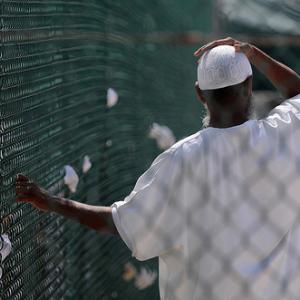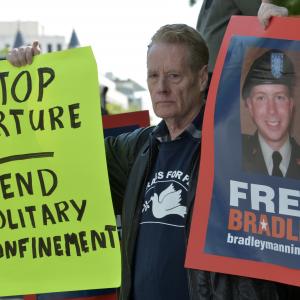Helen Schietinger, retired nurse living in Washington, DC, is active in Witness Against Torture, a grassroots organization working to close Guantanamo, end torture and indefinite detention, and hold officials accountable for torture of prisoners in U.S. custody.
Posts By This Author
Who Will Save the Guantanamo 92?
In today’s White House press conference, CBS News' Bill Plante raised the questions with President Barack Obama about the growing hunger strike among prisoners at Guantanamo Bay. “Is it any surprise, really,” asked Plante, “that they would prefer death rather than have no end in sight to their confinement?"
"Well, it is not a surprise to me, “ President Obama responded, “that we've got problems in Guantanamo.”
Last week, a military spokesperson confirmed that the total number of irregularly held prisoners at the U.S. Naval prison at Guantanamo Bay has risen to 92 out of the 166 still in detention.
The Guantanamo prisoners began hunger striking on Feb. 6 after guards confiscated their Korans to examine them for contraband. The prisoners reported that their Korans had been desecrated by the guards, which a military spokesperson denies. Fueling the strike is the men’s loss of hope of ever leaving Guantanamo alive, most having been held more than 11 years without charge and Obama refusing to free even the 86 cleared for release.
Closing the Loop on Khalid Sheikh Mohammad?
The myth that President Barack Obama closed Guantanamo his first year in office persists, but four years later the detainees are still there. Can justice be served?
I wanted to find out for myself. Over the past month, the Obama administration has started prosecuting some of the Guantanamo prisoners. They are tried in a specially constructed courtroom at Guantanamo, under military commissions rules touted to restore the rights absent under former President George W. Bush’s tribunals.
The trial logistics are a challenge: the tribunals convene periodically on the Guantanamo naval base under tightly controlled conditions. Additionally, the hearings are simulcast to military bases in the U.S. where members of the public and press are allowed to view.
I went to the Ft. Meade army base in Maryland to view the proceedings via closed circuit TV. While I was there, Khalid Sheikh Mohammad, alleged ringleader in the September 11, 2001, attacks, and four other men charged with various crimes related to 9/11, were on trial. The government is asking for the death penalty for all five men.
‘Bradley We Hardly Knew Ye:' 1,000 Days of Detention
On Saturday, Feb. 23, Bradley Manning marks his 1,000th day in prison without a trial. Manning, the 23 year-old Army intelligence analyst accused of leaking classified documents to WikiLeaks while stationed in Iraq, spent a full 600 days in prison before he even saw a judge, even though military law requires arraignment within 120 days of a person being detained. (Amid the material that Manning released was the now famous video showing two American military helicopters shooting civilians in Baghdad in 2007, killing two Reuters journalists.) During his confinement, Manning has been subjected to abuse and humiliating treatment.
Amnesty International wrote, “We’re concerned that the conditions inflicted on Bradley Manning are unnecessarily severe and amount to inhumane treatment by the US authorities. Manning has not been convicted of any offense, but military authorities appear to be using all available means to punish him while in detention. This undermines the United States’ commitment to the principle of the presumption of innocence.”
U.S. law is based on the presumption that a person is innocent until proven guilty. Our Constitution guarantees all persons in U.S. custody (not just citizens — Cole, D., Enemy Aliens, 2003) the rights to due process of law, humane treatment, and a speedy and public trial. Bradley Manning is only one example of how the U.S. is failing our own constitutional standards.


